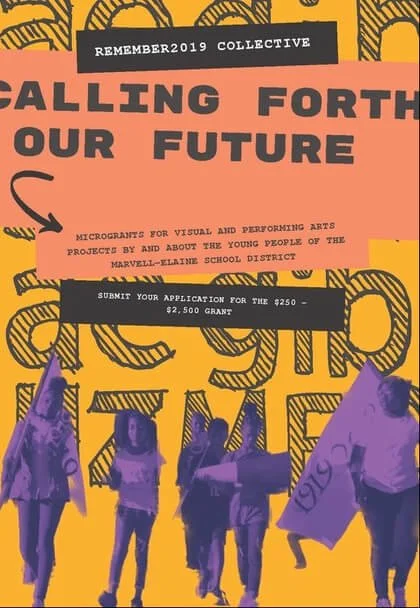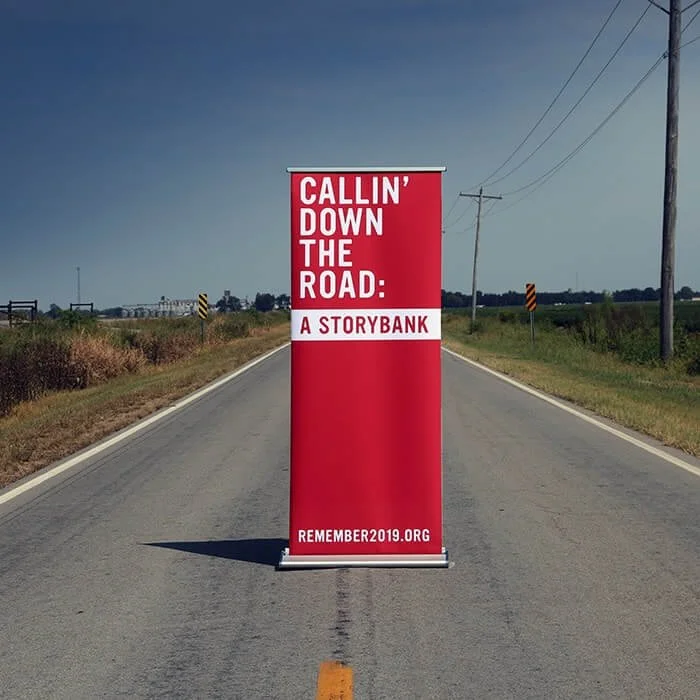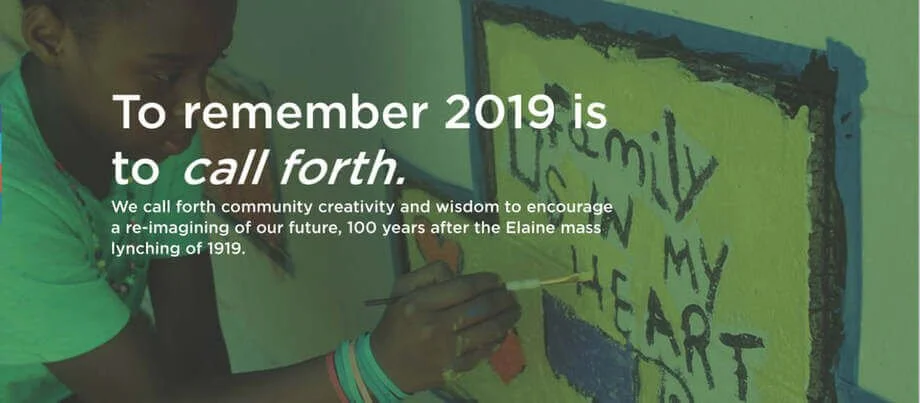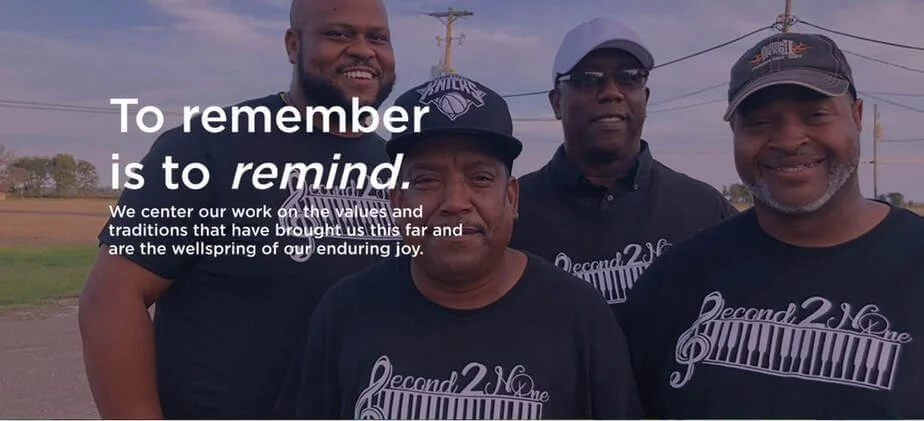remember2019
Since 2017, this effort to make space for the congregation of Black communities in the Arkansas Delta has resulted in a touring blues concert, publication of a book, a community mural designed by youth, a story sharing institute and
annual artist residency,
and much more.
Calling forth our future
Calling Forth Our Future uplifts the creativity of students and faculty from the Marvell-Elaine School District by supporting six visual and performing arts projects that unite community members, encourage interconnectedness, remind our community of the values and traditions that bring them joy, and imagine into our collective future.
The Six Projects Include:
Brick By Brick by Dorothy Ryan
We All Want Diplomas by Deantrell Zigler, Bryan Rogers, Curtis Hart, Dequintus Wilson, and Jordyn Wilson
The Marvell-Elaine Story by Johana Nichols
Virtual Museum by Ruth Brown
Paint the Future by Amiya Scaife
Community Togetherness Cooking Show by A. Shelby and D. Sims
Decisions were made via a panel (Michael Boon, Veora Williams, DeraShaun McGee) of culture bearers from South Phillips County lead by program coordinator Ethel Williams.









Vision and mission
To Remember is to Recall
We recall the mass lynching of 1919 and the intergenerational trauma that it caused for the Black communities of Phillips County.
TO remember is to reunite
As members of distant and different communities, we re-member these communities in order to self-determine, see one another and value our interconnectedness.
To remember is to call forth
We call forth community creativity and wisdom to encourage a re-imagining of our future, 100 years after the mass lynching.
To remember is to remind
We center our work on the values and traditions that have brought us this far and are the wellspring of our enduring joy.
-
We believe that the stories we share reflect the truths we live by. We are committed to creating spaces to listen and share stories so that these truths can continue to inform and reshape our cultural narrative.
-
We believe that the Black cultural and spiritual traditions of the Arkansas Delta region hold within them the capacity for transformative storytelling, radical imagination, and healing. Our work is to lift and expand the capacities of Black local cultural traditions while interrogating and holding the specificity of our own cultural lenses and traditions.
-
We recognize that there are many culturally specific forms of collecting history. We recognize that history is fundamental to culture and that cultures have been systematically weakened and destroyed when their forms of collecting history are delegitimized. We are committed to practicing culturally specific traditions of collecting and sharing history.
-
As informed by our community partners, we want to invest in the economic betterment of the community through our cultural work. We are committed to raising funds from individuals and investors that are seeking economic justice and not the exploitation of peoples oppressed by poverty. We are committed to engaging in transparent conversation with our community partners about our budgets. Finally, we are striving to allocate at least 40% of our funds for our community partners and participants.
-
We believe that mass incarceration is a direct descendant of chattel slavery. The incarceral state continues to deny our communities’ the right to self-determination. We believe that a transformation of all of our social systems must take place to justly hold all members of the beloved community.
-
We are committed to organizing spaces that are intergenerational. We believe that transmission of Black local cultural traditions across generations is essential to the processes of self-determination, memory, and reflection.
-
We seek an expansive imaginary that builds bridges with our enemies; that imagines complex realities that go beyond dualism and polarity; that risks stepping into the mystery of the unknown that lies beyond the far too familiar landscape of violence.
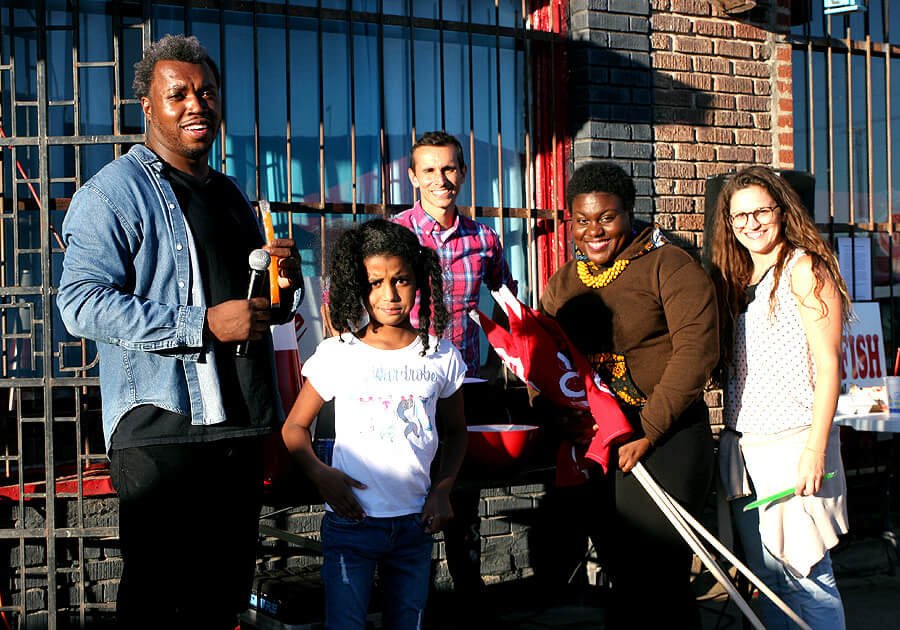




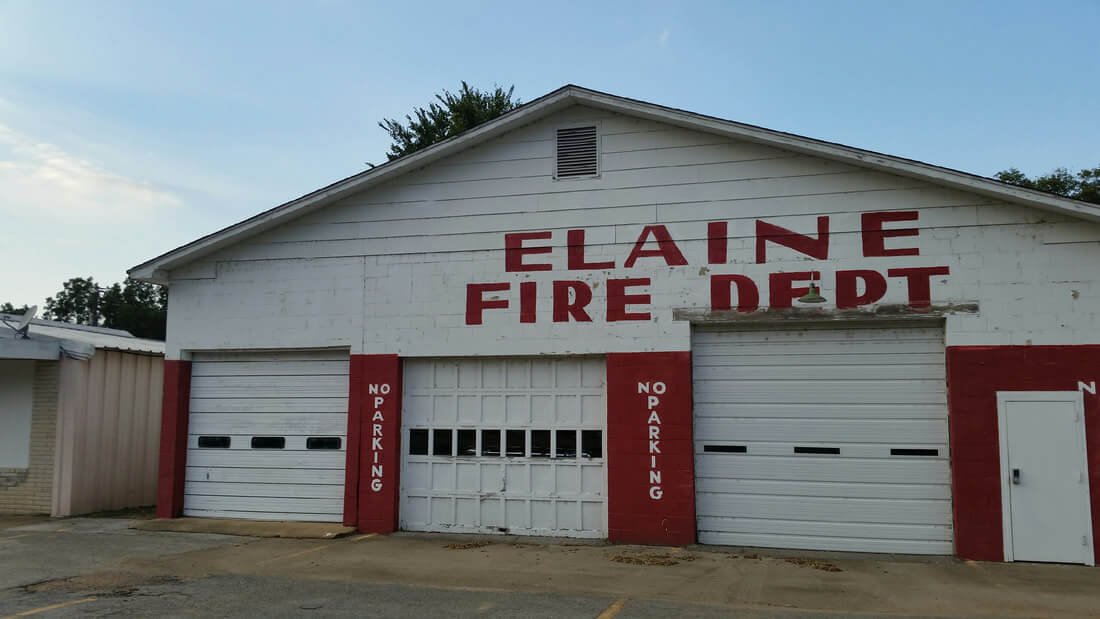
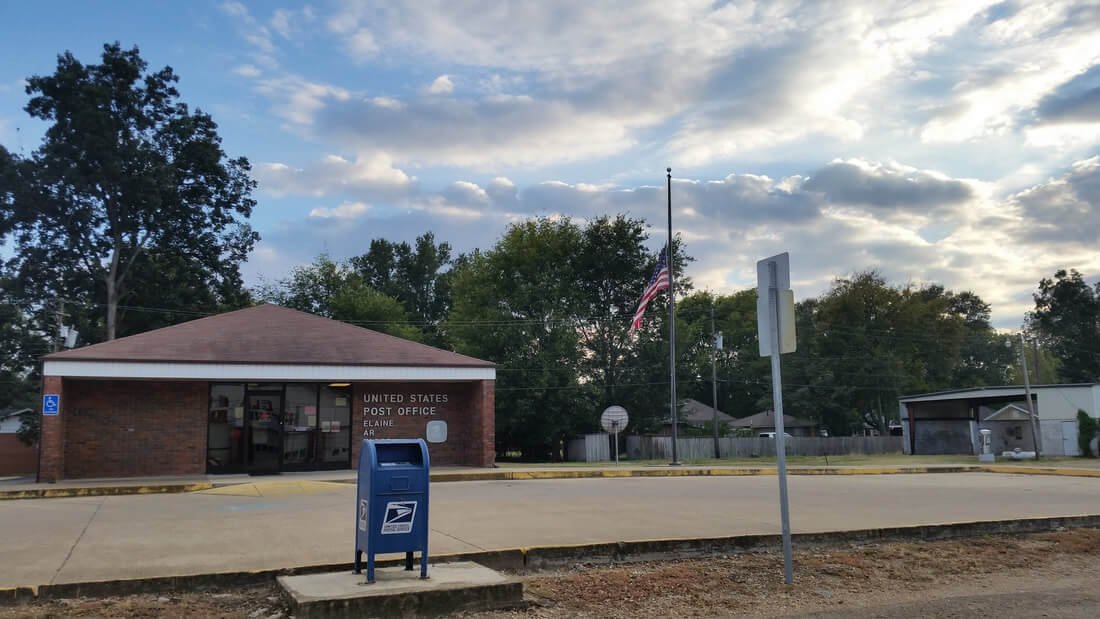
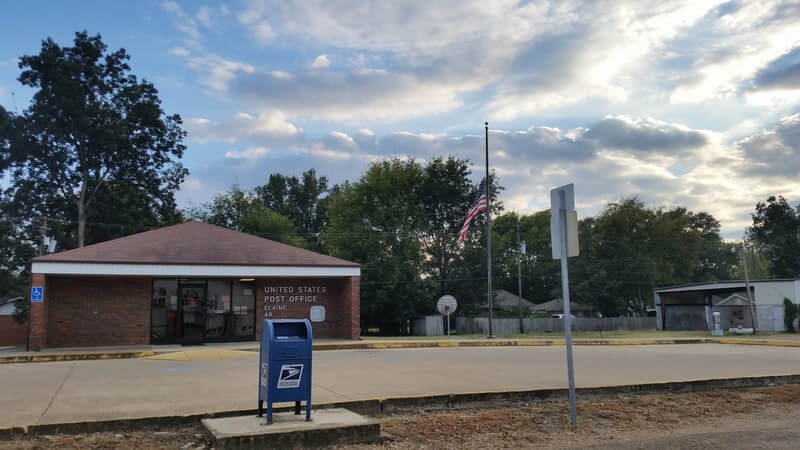
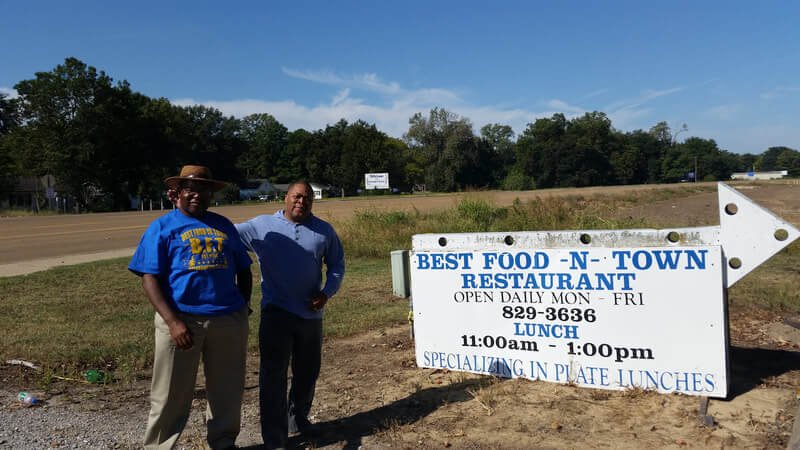



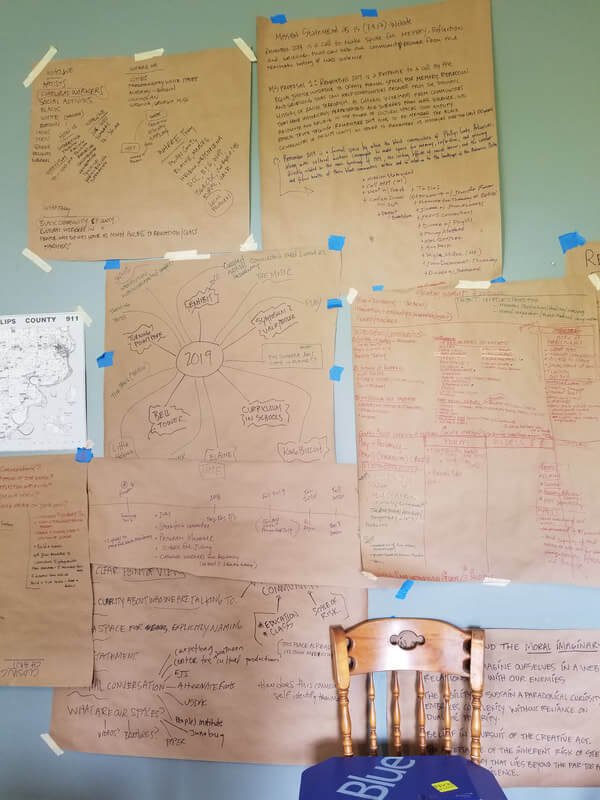




Play History
black cypress
During the pandemic, six lead partners in South Phillips County, Arkansas (the Elaine Legacy Center, BGACDC, Veora Williams, Brenda Hughes, DeraShaun McGhee, and Carol Birth with Phillips Community College at University of Arkansas) worked with an on-the-ground coordinator, Anita Marie Harrison, to commission members of the Delta's Black communities to submit written letters, testimonies, songs, prayers, poems, drawings and photos on how their communities have overcome crisis from generation to generation. These pages were then published as a hardback book entitled Black Cypress: A Phillips County Survival Guide . Click here to email and request a copy of the book, with all proceeds going to the community.
This book is about history and how that history informs the present moment. It is also about hope, the enduring joy that has kept the Black community moving forward toward full freedom and justice against severest odds. It is about the future and what we want future generations to inherit. It is about legacy. About community. About sharing where the Black community of the Arkansas Delta has journeyed from and where we dream of going, together.
Next, 6 Arkansas-local artists (Veora Williams, Brenda Hughes, DeraShaun McGhee, Carol Birth, Lenora Marshall and Anita Marie Harrison) took the page to the stage by creating interactive community-engaged performance pieces based on the book, which toured the Delta.
Centennial Programming.
In fall 2019 we launched the callin’ down the road: RESIDENCY. This inaugural program supported six community members from across Phillips County, Arkansas in thinking about how story sharing is a part of their life and work. Through this residency they developed their own self-determined story sharing practices, networked with other people working with the power of story, and received resources (including funding and training) to support a story sharing project of their own making.
Some of their projects focused on the way that colorism affects women in the African American community; the way music changes across several generations of related musicians; bringing youth and elders together to ask questions and share cross-generational stories; and how different generations feel about remembering the massacre that took place in Elaine and throughout Phillips County in 1919.
Howlround published this article, which looks back on the program its fourth year, after the centennial. Remember2019 has also been profiled by the U.S. Department of Arts and Culture, featured on Medium and Monument Lab, invited to speak at NPN's annual conference, USDAC's Citizen Artist Salon on "Creative Strategies for Commemorative Justice," and at the Children’s Defense Fund & Samuel Dewitt Proctor Institute for Child Advocacy Ministry (read Mauricio Salgado's writing about that workshop here).
Remember2019 is made possible by the JKW Foundation, an NEA ArtWorks Grant, Network of Ensemble Theaters (supported by lead funding from The Andrew W. Mellon Foundation), the US Department of Arts and Culture, Highlander Institute, AlternateRoots, and The MAP Fund (supported by the Doris Duke Charitable Foundation and the Andrew W. Mellon Foundation).
In tandem with this work, Remember2019 presented the callin’ down the road: STORYBANK, a pop-up story booth that took place at Black churches, barbershops, restaurants, senior centers, and schools. Stories shared at the booth were assembled into a 100-minute mixtape, resulting in a quilt of Black experiences, songs, and soundscapes from all around the county. The mixtape was presented at callin’ down the road: MIXTAPE LISTENING PARTIES—a series of events that gathered the Black community to listen, remember, dance, share food and drink, dream, and celebrate Black freedom in Phillips County. Moreover, the 100 stories that were collected are now available as a digital archive with accompanying transcripts on Remember2019.org.
Pictures by Yazmany Arboleda. Pictured 2019 callin' down the road residents: Faye Duncan Daniel, Phillip Stackhouse, Ethel Williams, James White, Lenora Marshal, Anita Mayo Harris
“not another memory play: remember2019” on HowlRound
“Our archives are a way of organizing and centering these stories, and the ways we’ve gone about collecting them and performing them subvert
traditional notions of what makes for legitimate historic documentation.”
“Prototyping cultural democracy”
by Arlene Goldbard, Chief Policy Wonk at the U.S. Department for Arts and Culture.
See Monument Lab's four part series on Remember2019 where the creators discuss vision and values, process, aesthetics, and impact.
“We believe that culture influences policy” ... “Therefore, it is our responsibility to reframe our cultural narrative so that it inspires just policies. This project begins by recognizing a history that was intentionally devalued and disposed of in order to entrench a normative white supremacist culture. In order to do that, this project will embody equity and participation by prioritizing the leadership, stories, and talents of community members that have been historically ignored. Our model is flexible, scaleable and nimble enough to adapt to the specific context and goals of the community, while still based in well-researched frameworks and proven methodologies.”
founding members of remember2019
Arielle Julia Brown
Carlos Sirah
Mauricio Salgado
Yazmany Arboleda


